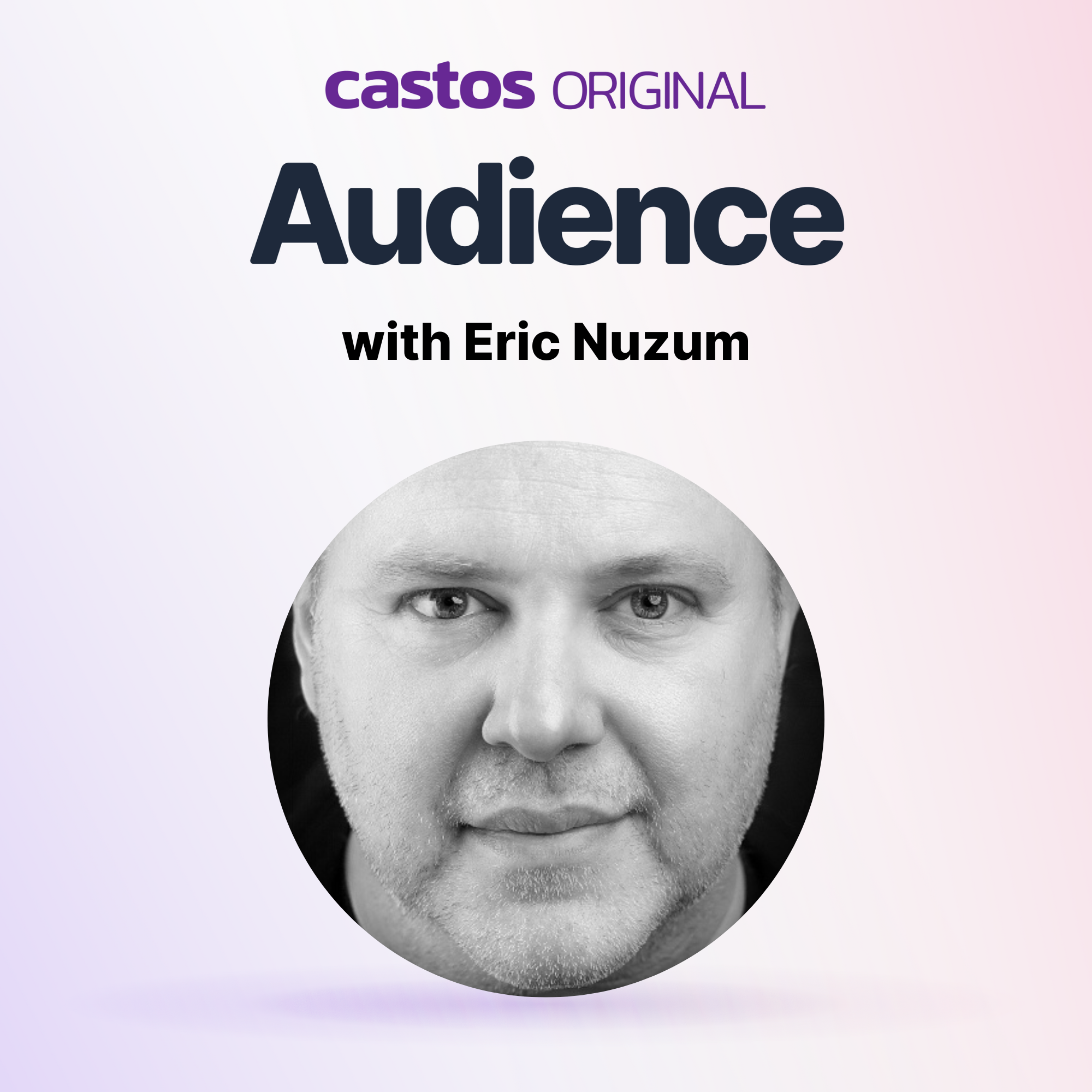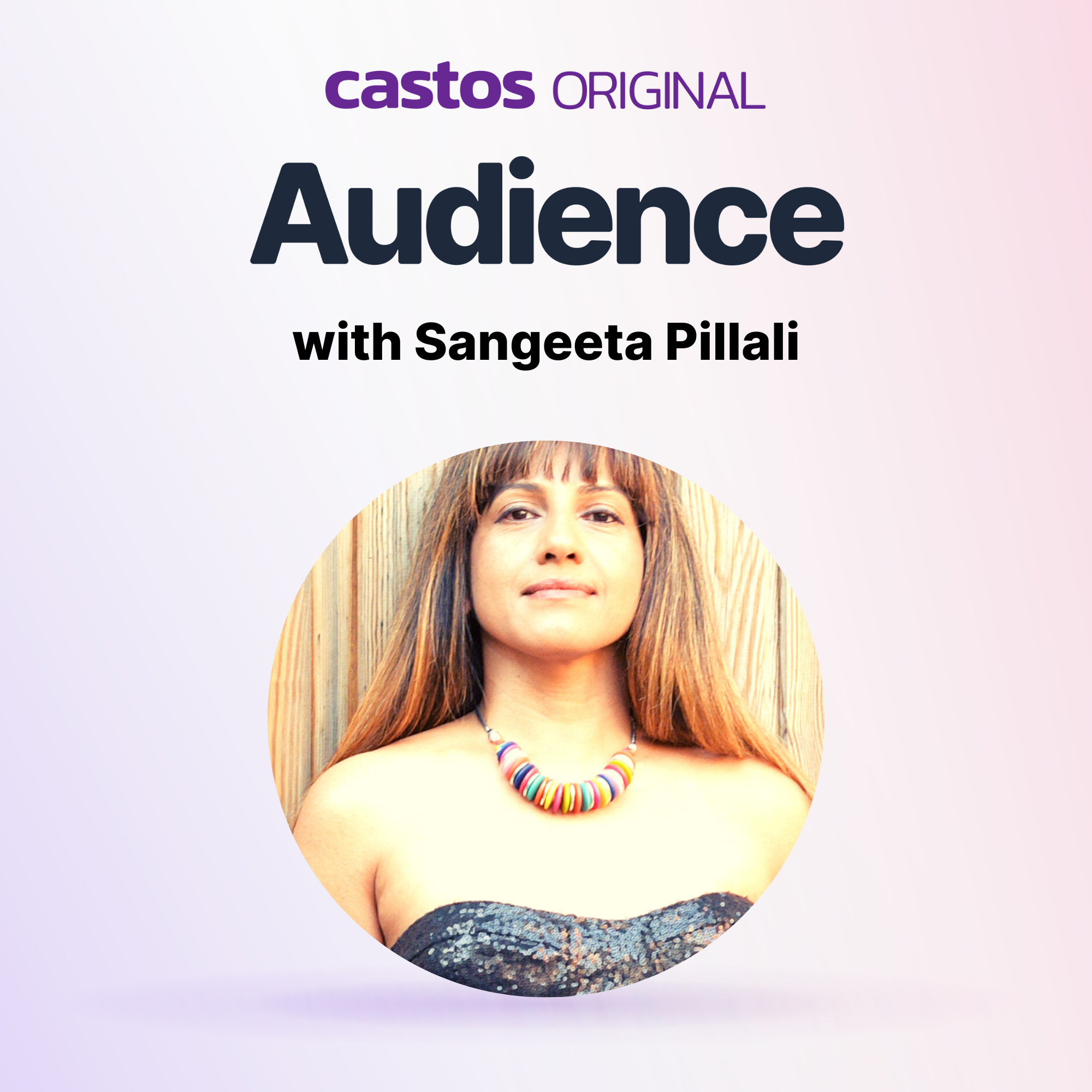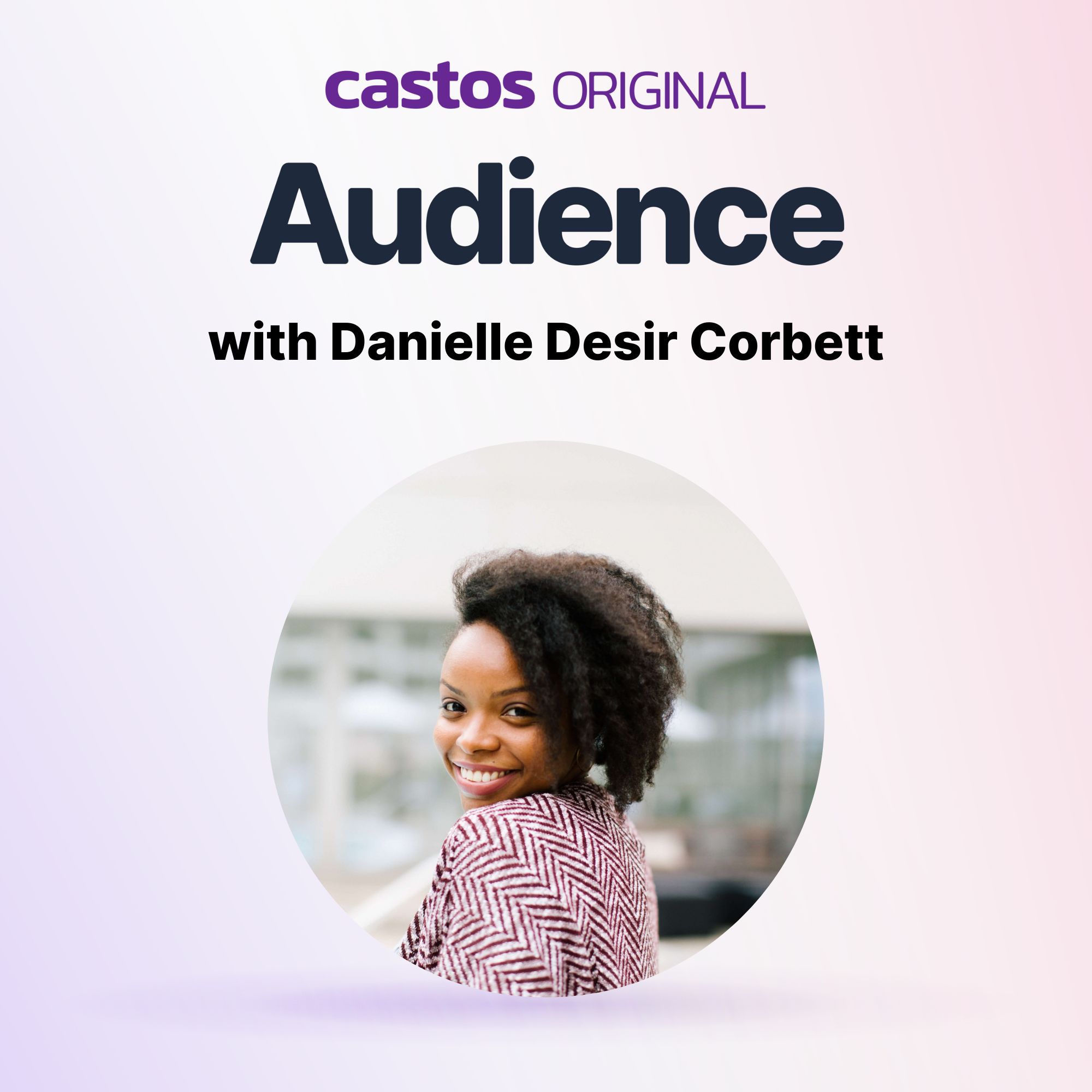Speaker 0 00:00:00 Hey Stewart here while we work on some new episodes, I thought it'd be cool to look back into the archives for a conversation I had with Eric Newsom, along with Jesse Baker. Eric is the co-founder of the audio production and consulting company, magnificent noise. He's also the author of a book called make noise, which is a really good read. No matter how much experience you have with audio. The theme of our conversation was about creating an audio experience and listen closely to how Eric distinguishes between audio and podcasting, because there is a difference. So if you missed it the first time around that conversation is next. But before we get to that, I actually would like some help from you. I mentioned new episodes, right? Well, currently I'm working on a story about the use of stock media and podcasting as a podcaster. Do you use stock media for your projects? If so, what's that experience been like? Are you a creator who makes stock media for others to use as a listener? Can you tell the difference between stock media and something that's been commissioned? No matter how you relate to the medium, we'd love to hear from you about your experiences, the good, the bad, the ugly, and everything in between. You can reach out to me personally, via
[email protected]. All right, on to the episode,
Speaker 1 00:01:28 My name is Eric Newsum. I'm the co-founder of magnificent noise, which is a podcast in audio consulting and production company. That's based in New York.
Speaker 0 00:01:38 Before that he was one of the brains behind the Ted radio hour at NPR, the podcast, invisibility, and worked on radio programs like fresh air. And wait, wait, don't tell me, he's also collaborated with audible and helped create a podcast like the butterfly effect that John Ronson and where should we begin with Esther Perl? So without going through the rest of his resume, let's just say, this guy knows audio, by the way, I'm consciously using the word audio, because while we're mostly talking about making podcasts, Eric is big on creating an audio experience more so than just a podcast.
Speaker 1 00:02:13 The, the world of spoken word audio is changing so much and so fast that something that we're doing today, would've been thought UN undoable five years ago. And, and, and many, many examples of that. And that rate of change is happening so much and so fast and new opportunities to distributor coming out so much and so fast that the platform doesn't matter. You know, I've, I've been counseling radio people for many years to stop thinking of radio as a technology and start thinking of it as an experience, an experience that can transcend different platforms. And I think I give the same advice to podcasters. A lot of podcasters are very precious about podcasting. They feel like, um, for many years, those who've been in podcasting for some time experienced a time when people didn't understand what they did or didn't understand what a podcast was and kind of had trouble kind of connecting all those dots in their head.
Speaker 1 00:03:10 And, uh, so they are very precious as a word I used deliberately, cuz I think they, they, they put on blinders because of their belief in zealotry, around podcasting as an experience. But very little that's in podcasting, um, was invented in podcasting. It was invented in another medium and brought to podcasting and podcasting has evolved these things and it will go on to a new platform and it went after that too. So I think the reason we refer to ourselves as an audio company, more specifically a spoken word company is currently that can go in many different places. It can go on the radio, it can go in a streaming service. It can go in an audio book, it can go in a podcast. It can go in just an MP3 file that you send to someone or, or a voicemail. It can go to all kinds of different things. And those number of options will just continue to expand.
Speaker 0 00:03:59 I think the nuance here matters on one hand when making audio, there are certain principles that transcend mediums I've used the term radio reimagined describing podcast before. And like Eric said, a lot of what we do in making a podcast is borrowed from radio, but then we fine tune it to make it work for a podcast. Here's a personal example. When I worked in radio, I had a brief career as an on-air host at a small public radio station. One morning, our program director taught me an important lesson. She wanted me to imagine a supposed listener and what they might be doing while they listened to me, this was a morning show, right? So they were likely driving the car to work or getting ready to face their day. So I needed to do things like give the weather forecast and even updates on the time. You know, stuff like that. Radio hosts are always making those kinds of decisions you ever noticed on NPR, how the hosts are constantly reminding the listeners who the guest is while that's, because when something goes out live, you can't assume that every person listens to a program for beginning to end good radio presenters, understand their form, live radio and their function to inform
Speaker 1 00:05:15 In podcasting. It's a little different, but at the base level, it's still the same in podcasting. Instead of imagining what your listener is doing. When they're listening, that's been, you've taken time and location out of the equation because people listen when they want to, where they want to, not. When you happen to be speaking into that microphone, like in a radio sense where you know, it's 7 0 5 in the morning, and you can guess what most people are doing at 7 0 5 in the morning as they're getting their day started. But you don't know what the podcast, when someone's gonna be listening. So the question you ask instead of how am I fitting into what the, how the listener's listening to this now, a Podcaster's question is, what problem am I solving for them? Right? What need do they have that I'm filling, which transcends geography and transcends time.
Speaker 1 00:06:08 And in that sense, like people who are listening to your podcast now wanna be better podcasters. They wanna be better at building audience. They wanna be better at connecting with an audience, right? That's the problem they have that. I hope your episodes fulfill for them. If there's a comedy round table, it's like, I wanna laugh. I want to escape from the day. Right? And that's the function, that's the ID. The idea is what am I, what role is my show playing in the life of that listener? Am I the escape? Am I the occasion to think about something other than what's in the headlines? Um, is it my opportunity to learn? Is it my opportunity to not feel alone in what I'm trying to solve in the world and understanding that is that function then dictates form. Like, so if I am having, um, a conversation with a group of cancer survivors about, uh, surviving cancer and kind of coming out the other side of it, what do they need that I'm fulfilling? How do I connect with them? And the form that that conversation takes is based off of the function of connecting that community. Does that make sense?
Speaker 3 00:07:18 It makes absolute sense. And, and I, and I think it's a good example of how a lot of people, a, a mistake, I I've noticed a lot of people making is working backwards from almost where they need to go. So in other words, people kind of come already with a form, which let's be honest. I won't put a percentage on it. Often it's this a stock intro, a Q and a with someone from their industry that they find interesting, lightly edited a stock outro with a call to action. And then they try to figure out, all right, how does that function? Where can I go? And where can I promote this? And they haven't necessarily done a lot of the work you just described. And that's, that's tricky work. I think
Speaker 1 00:07:59 Actually it's not, it's not, you don't
Speaker 3 00:08:00 Think so. Okay.
Speaker 1 00:08:01 People don't do it.
Speaker 3 00:08:02 Okay. Fair enough.
Speaker 1 00:08:04 <laugh> uh, they, they start off with like, I'm gonna make a podcast. I'm gonna have an interview show in which I'm talking to one person. Like why, why every point in that process, why, and there's two routes to success. That's it just two, one is I'm just gonna do this over and over and over again until I eventually learn how to do it well and connect it to an audience. And the audience builds over time. That's a very long, long process. It can take years to get really good at doing something and kind of really figure out what you do. Well that's, if you get successful, if you are successful, there are only two paths. The other path is to start with almost like a reverse engineering mentality of like, what am I trying to accomplish? And what's the best choices I can make in order to accomplish that thing.
Speaker 1 00:08:54 If I am creating, uh, that's what you can get into. Even like, when people say, how do I know my show is successful? I'm like, well, who are you trying to reach? And what are you trying to accomplish with this show? You know, if you are the real estate agent in Northern California who talks to other, who just wants to talk to other real estate agents in Northern California, and it's a couple hundred people, a couple thousand people, so what is your audience gonna be for your podcast? It's not gonna be millions. It'll probably not even be thousands but hundreds. You could really be the voice of a real community and that's success. And actually that's based off a real guy and he is successful and he's never gonna be, you know, charting in the top of the iTunes charts and shouldn't care about any of that.
Speaker 1 00:09:38 But the person who's like, I'm gonna interview, you know, it's, it's such a reverse engineering process that people are like, I really want to talk to people about film. Like, well, you know what? There are tens of thousands, literally of people talking about film. There are probably more podcasts about film than there are films, if that's the case. And I think that's probably true what makes yours different than everybody? Else's what is the white space that only you can do? You know, it could be, um, I just got an email from someone this morning who is a woman in her sixties. Lesbian wants to make a podcast about film from that perspective in that worldview. I'm like, yeah, there's probably some others like that, maybe, but that's a pretty unique lens on film and she's not gonna have as much competition of just, she said, I'm gonna make a podcast about film. And I think understanding that uniqueness and, and what you're, what white space you're trying to fill. And this design backwards from there is, is really the pathway to success.
Speaker 0 00:10:42 So let's see this in practice from Eric example, a sometimes scraping an ambitious idea can be for the best.
Speaker 1 00:10:48 So I used to work at a company called audible. I started the original content efforts at audible, which still go on to this day. And when I started there, there was a lot of angst and anxiety about podcasting as a field and how, what it meant for audible and the guy who founded audible, um, came to me one day and said, this is when game of Thrones was really starting to peak. And he said to me, um, I want you to go out and find the best, the best game of Thrones podcast and make them an audible exclusive, just make that happen. Like that statement showed a profound lack of understanding of what podcasting was, because there is no best. There are hundreds of game of throne, podcasts, game of Thrones podcasts from young women, black men, uh, people who live in certain parts of the world. Who've been lived in different political systems before. They all look at that story differently. And then, and they create the best, uh, for their community. So there are hundreds, there are thousands of game of Thrones podcasts, and probably thousands of variants on how you talk about that television show. And so it wasn't that there was one best. It was, there were hundreds and hundreds and hundreds of bests. And what decided best was what was best for you. So that in, in a nutshell encapsulates not just podcasting, but understanding how to design for podcasts,
Speaker 0 00:12:19 Which brings us to example B, remember how I said that Eric was vital in bringing a Ted radio hour to life at NPR.
Speaker 1 00:12:26 It's, it's an interesting story because there's a couple things in it that speak to bigger things. One was that, uh, so as it happened, the woman who was like the general counsel at NPR used to work with the guy who was kind of the business affairs lead at Ted, and they said, Hey, we should figure out how to collaborate or figure something we could do together. And so they brought it to me and said, could we have a sit down meeting with a couple people from NPR and a couple people from Ted we'd like you to bring an idea like, okay. Right. And I called around and asked a lot of people for their input, um, and, and ideas. And almost everyone tried to talk me out of it of, you know, Ted has tried this before. They've tried to work with other people to figure out how to do a podcast or a radio show.
Speaker 1 00:13:16 And it's never really gotten off the ground, um, that, uh, it, so it's really hard to take a Ted talk and kind of make it into something that works on the radio and blah, blah, blah, blah, blah. But I, I was kind of undeterred and I, I walked into that meeting and I basically pitched the outline of Ted radio hour. And in, in that, I called it Ted radio hour because I was trying to use the moth radio hour, which is now the moth's podcast as a launching point to think from where they took things that were already recorded and presented them on the radio. And I'm like, there's a way to, instead of doing the moth radio hour to do the Ted radio hour where you can actually use Ted talks, I said, but you just can't have the audio. The Ted talks, there has to be something that feels more than just what happened on that stage.
Speaker 1 00:14:03 And because so many Ted talks, it doesn't seem that way when you think about it. But a lot of Ted talks have visual references or there's cues that happen or slides or something. It's just hard to convey in an audio only format. So I, I came in and I said, let's do this, but, um, and make it the Ted radio hour instead of the moth radio hour. But then let's talk to the people who did the Ted talk and see if we can expand out what they talked about. And when we did the first season of Ted radio, we literally did that. We would play little clips of a Ted talk on a theme, or maybe a couple different Ted talks. And we talked to the people who did those about their ideas. We did that. We launched it. It was a massive hit. It was named, you know, the iTunes at the time, the apple podcast's new podcast of the year.
Speaker 1 00:14:50 It was, you know, downloaded a ton of times and was on a bunch of stations. And when we, the dust settled, even though we were, should have been very, very happy with what we did, we didn't feel, we quite nailed it. Like it didn't really feel like at the level that we had kind of hoped. And so we backed up and kind of started over again. We took 10 months off and we did some talking and experimenting and came up with a much more of a let's tell stories and use the Ted talks to launch, to tell more stories and which may or may not be connected to the Ted talk at all, because we felt like we were just having these conversations about Ted talks instead of having conversations about ideas. And so that's, we ended up on the formula that, that they still use today.
Speaker 0 00:15:35 Okay. So you may not be the person who creates the next Ted radio hour, but no matter where you are in your podcasting or audio creation journey, you can heat Eric's wisdom to make your ideas better. I know I plan to
Speaker 1 00:15:48 Even an experienced podcaster who's has a podcast, which is in production in the world, always benefits from taking a step back and even asking questions about why I often tell people it's, it's a good idea to deconstruct your impulses. Like, if you're like, oh, that's not an episode I would do. Why that's not a guest, I would have why and answer those questions beyond just like, I don't like it. Think about the experiences you're trying to create and who you're creating them for and what the intended effect is of them and answer questions. And just deconstruct that impulse, you make a choice immediately. Like that's something I'll do. That's something I won't do. We don't stop to think about why, but the more we stop to think about why the more we understand what we're doing better. And I think that anyone who's looking to grow, you know, most people come to me, I wanna grow my podcast. I'm like, look, great. Let's talk. And they want to talk about social media. They wanna talk about advertising. They want to talk about audience development, all these things. And I'm like, that's not, you're not ready for that conversation. Let's look at what you're actually making and see how that can be more effectively organized to achieve what you want. And people never think about that. They're like, how do I market the podcast I'm making rather than how do I make the podcast that will achieve what I want?
Speaker 0 00:17:17 Well, let's get back to technology for a minute because it's useful. And to a point pretty necessary, but it's also always gonna change. I could make an entire episode to give you all kinds of recommendations on Mike's editing software, all that jazz. But by next year, it'll probably be outdated if not sooner. And it's not really why I got into making audio to begin with, for me, it's all about the ideas platforms will come and go. They're gonna keep making snazzy new microphones that keep getting better. And there's eventually gonna be another medium. That's more intimate and more accessible than even podcasting, but don't be scared by that because if you learn how to make something good, you'll always have an audience.
Speaker 1 00:17:58 A, a great example of this point is look at Marvin gay, right? Marvin Gay's an artist. People have listened to Marvin gay on tons of different platforms, many that of which have come and gone. Like they listen to Marvin gay LPs, 40 fives and 30 threes on eight track tapes on cassettes, on CDs as digital downloads, you buy as digital downloads or digital streaming, like the medium doesn't matter. It's the, that experience of being able to hear that voice in those songs. And that is the great wait. That's the best way that I can think of as an analog for how to think about audio storytelling. There has always been an interest in audio storytelling. There will always be an interest in audio storytelling, the method you used to deliver. It changes. And you just have to make sure that you're providing something consistent through, through all the change.
Speaker 4 00:18:56 Hey, there, listener it's Matt, before you go, I want to offer you the aspiring podcaster to special items. Number one, if you haven't started a podcast yet, or you want to find a better podcast hosting company, start here at Casto use our coupon code audience 20 that's audience two. When you sign up for a new
[email protected], start a podcast like the one you just heard or about gluten free muffins, whatever it is, we'll help you get your podcast out into the world. Number two, did you know that our academy is free enrolled today for
[email protected]. Get access to our courses, videos, and templates all for free. Thanks for listening to the audience podcast today. We hope we're helping you become a better podcaster. All that's left for you to do is share this episode on social media buy for now.






